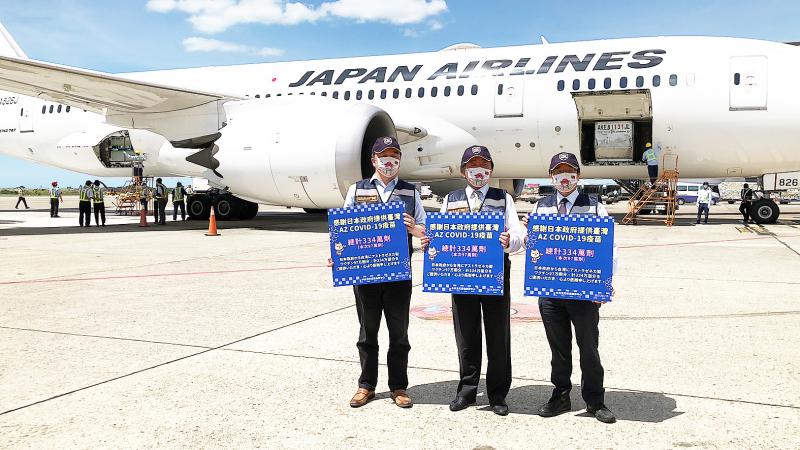Taiwan yesterday received three shipments of COVID-19 vaccines, a total of 1.88 million doses.
The nation has so far received 8.92 million doses of the AstraZeneca and Moderna vaccines.
First to arrive was a donation from Japan. A Japan Airlines Co flight arrived at Taiwan Taoyuan International Airport at about 1:45pm with 970,000 doses of the AstraZeneca vaccine on board.

Photo: CNA
Minister of Health and Welfare Chen Shih-chung (陳時中), who heads the Central Epidemic Command Center (CECC), and center officials Wang Pi-sheng (王必勝) and Chou Jih-haw (周志浩) greeted the flight holding signs thanking the Japanese government for its latest donation.
Japan has donated a total of 3.34 million doses of the AstraZeneca vaccine to Taiwan. The first batch of 1.24 million doses was delivered on June 4, while a second batch of 1.13 million doses arrived on Thursday last week.
Japan’s three donations would cover about 15 percent of Taiwan’s population, and are a tremendous help in the nation’s fight against COVID-19, Chen said at the airport.
“We are very grateful,” he said, before thanking the Japanese government and people once again for their friendship toward Taiwan.
A second shipment arrived at the airport at about 3:15pm.
The China Airlines Ltd (中華航空) flight, which flew in from Thailand, delivered 560,000 doses of the AstraZeneca vaccine — ones purchased by the government.
Taiwan signed a contract with AstraZeneca PLC for 10 million doses on Oct. 30 last year — this was the third delivery, the center said.
The first delivery of 117,000 doses arrived on March 3, while the second delivery of 626,000 doses arrived on Wednesday last week.
Yesterday’s final shipment of vaccines arrived at the airport at about 4pm. The China Airlines flight, which flew in from Luxembourg, arrived with 350,000 doses of the Moderna vaccine.
Taiwan signed a contract with Moderna Inc for 5.05 million doses, the center said.
With yesterday’s shipment — the fourth delivery — the nation has so far received 1.15 million of the doses, it said.
The first delivery of 150,000 doses arrived on May 28, followed by 240,000 doses on June 18 and 410,000 doses on June 30.
As of 5pm yesterday, 7.58 million people had registered online to get vaccinated against COVID-19: 2.5 percent chose the AstraZeneca vaccine, 55.19 percent chose Moderna and 42.31 percent said they would accept either vaccine, the center said.
As of Wednesday, 4,337,272 COVID-19 vaccine doses had been administered — 4,242,075 first doses and 95,197 second doses, CECC data showed.
Additional reporting by CNA

CHAOS: Iranians took to the streets playing celebratory music after reports of Khamenei’s death on Saturday, while mourners also gathered in Tehran yesterday Iranian Supreme Leader Ayatollah Ali Khamenei was killed in a major attack on Iran launched by Israel and the US, throwing the future of the Islamic republic into doubt and raising the risk of regional instability. Iranian state television and the state-run IRNA news agency announced the 86-year-old’s death early yesterday. US President Donald Trump said it gave Iranians their “greatest chance” to “take back” their country. The announcements came after a joint US and Israeli aerial bombardment that targeted Iranian military and governmental sites. Trump said the “heavy and pinpoint bombing” would continue through the week or as long

TRUST: The KMT said it respected the US’ timing and considerations, and hoped it would continue to honor its commitments to helping Taiwan bolster its defenses and deterrence US President Donald Trump is delaying a multibillion-dollar arms sale to Taiwan to ensure his visit to Beijing is successful, a New York Times report said. The weapons sales package has stalled in the US Department of State, the report said, citing US officials it did not identify. The White House has told agencies not to push forward ahead of Trump’s meeting with Chinese President Xi Jinping (習近平), it said. The two last month held a phone call to discuss trade and geopolitical flashpoints ahead of the summit. Xi raised the Taiwan issue and urged the US to handle arms sales to

BIG SPENDERS: Foreign investors bought the most Taiwan equities since 2005, signaling confidence that an AI boom would continue to benefit chipmakers Taiwan Semiconductor Manufacturing Co’s (TSMC, 台積電) market capitalization swelled to US$2 trillion for the first time following a 4.25 percent rally in its American depositary receipts (ADR) overnight, putting the world’s biggest contract chipmaker sixth on the list of the world’s biggest companies by market capitalization, just behind Amazon.com Inc. The site CompaniesMarketcap.com ranked TSMC ahead of Saudi Aramco and Meta Platforms Inc. The Taiwanese company’s ADRs on Tuesday surged to US$385.75 on the New York Stock Exchange, as strong demand for artificial intelligence (AI) applications led to chip supply constraints and boost revenue growth to record-breaking levels. Each TSMC ADR represents

Pro-democracy media tycoon Jimmy Lai’s (黎智英) fraud conviction and prison sentence were yesterday overturned by a Hong Kong court, in a surprise legal decision that comes soon after Lai was jailed for 20 years on a separate national security charge. Judges Jeremy Poon (潘兆初), Anthea Pang (彭寶琴) and Derek Pang (彭偉昌) said in the judgement that they allowed the appeal from Lai, and another defendant in the case, to proceed, as a lower court judge had “erred.” “The Court of Appeal gave them leave to appeal against their conviction, allowed their appeals, quashed the convictions and set aside the sentences,” the judges